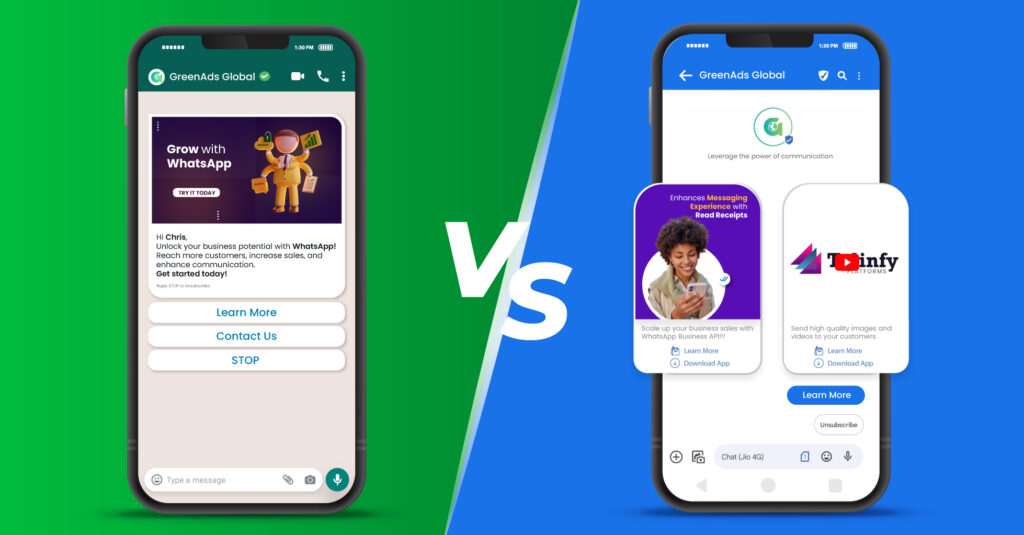The Messaging Showdown: WhatsApp Business vs. Google RCS for Businesses
The communication landscape for businesses is constantly evolving. Texting, once a casual exchange, has become a powerful customer service tool. But with so many options, choosing the right platform can be a challenge. Two major contenders are WhatsApp Business and Google RCS Messaging (Rich Communication Services). Both offer features designed to improve customer engagement, but they cater to different needs. Let’s delve into the key differences to help you decide which platform best suits your business.
Global Reach vs. Android Focus
-
WhatsApp Business: WhatsApp boasts a staggering 2 billion users worldwide, making it a clear winner in terms of global reach. This immense user base makes it ideal for businesses targeting international audiences or those with a diverse customer base. Additionally, WhatsApp has strong brand recognition, ensuring most customers already have the app installed.
-
Google RCS: RCS messaging is a carrier-dependent service currently limited to Android devices. While it eliminates app download requirements, user adoption is still in its early stages. This can limit your reach, especially if you target iPhone users or those who haven’t opted in to RCS on their Android devices.
Feature Frenzy: WhatsApp vs. RCS
-
WhatsApp Business: WhatsApp Business offers a robust feature set for customer interactions. You can create a business profile with essential information, manage customer inquiries, and even send automated greetings. Additionally, WhatsApp boasts strong media sharing capabilities, allowing you to send images, videos, and documents, fostering a more engaging experience.
-
Google RCS: RCS offers features similar to WhatsApp Business, including rich media sharing, typing indicators, and read receipts. It also integrates with existing business messaging solutions, allowing you to manage conversations across platforms. One unique advantage of RCS is the potential for verification through your carrier, potentially boosting brand trust. However, as a newer technology, RCS might lack some of the advanced automation capabilities of WhatsApp Business.
Privacy Matters: Encryption in Focus
-
WhatsApp Business: WhatsApp has built its reputation on user privacy. It utilizes end-to-end encryption, ensuring only the sender and recipient can read messages. This is a major selling point for businesses dealing with sensitive customer information.
-
Google RCS: While Google utilizes encryption protocols for RCS, it differs from WhatsApp’s end-to-end encryption. There’s a possibility that carriers might have access to message content, raising privacy concerns for some users.
Cost Considerations: Who Pays the Piper?
-
WhatsApp Business: Setting up a WhatsApp Business account is free. However, sending messages to customers who haven’t initiated contact incurs fees. This can be a drawback for businesses with large customer bases or those requiring frequent outreach.
-
Google RCS: The cost structure for RCS messaging varies depending on your carrier. Some might offer free RCS messaging, while others might charge per message. This lack of consistency can make budgeting for RCS communication difficult.
The Verdict: It Depends
The battle between WhatsApp Business and Google RCS doesn’t have a clear victor. The best platform hinges on your specific needs.
-
Choose WhatsApp Business if:
-
You have a global audience or a diverse customer base.
-
User privacy is a top priority.
-
You require advanced automation features.
-
You’re comfortable with potential message fees.
-
-
Choose Google RCS if:
-
You primarily target Android users.
-
You want a carrier-integrated solution.
-
Brand verification through carriers is important.
-
Cost is a major concern (depending on your carrier’s pricing).
-
Looking Forward: A Collaborative Future?
While WhatsApp Business and Google RCS currently compete, there’s a possibility of future collaboration. If Apple integrates RCS functionality into iMessage, it could significantly boost RCS adoption. Additionally, with both platforms offering APIs for developers, a more integrated business messaging ecosystem could emerge, allowing businesses to manage communications across platforms seamlessly.
Ultimately, the choice between WhatsApp Business and Google RCS depends on your specific needs and target audience. By understanding the strengths and weaknesses of each platform, you can make an informed decision to enhance your customer engagement strategy. Remember, you can also explore the possibility of using both platforms to maximize your reach and cater to different customer preferences.
